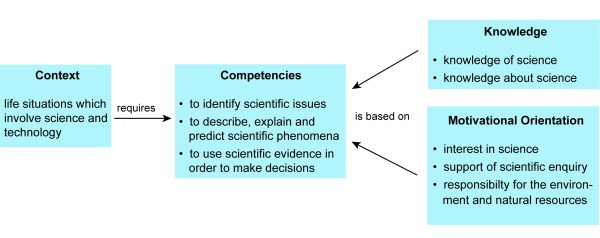The IPN, under the management of Prof. Dr. Manfred Prenzel, has been largely responsible for the domain of scientific literacy since the first PISA survey in 2000. The main focus of PISA 2006 is on scientific literacy, while reading and mathematical literacy are only secondary components.
The basis of the testing of science in PISA 2006 is a conception of scientific literacy which differentiates between the following three competencies:
- Identifying scientific issues (differentiating between scientific issues and issues that are not related to science),
- Explaining phenomena scientifically (describing, explaining and predicting phenomena), and
- Using scientific evidence (dealing with empirical evidence and scientific conclusions).
In order to solve the PISA tasks, one of these competencies is always necessary. In turn, the tasks can be classified into two main areas of knowledge: knowledge of science and knowledge about science.
In PISA, the term 'knowledge of science' relates to an object-oriented knowledge from the areas "living systems", "physical systems", "technology systems" and "earth and space systems" (e.g. knowledge of the structure and function of cells). In comparison, 'knowledge about science' focuses on understanding the acquisition and use of scientific data (e.g. knowing what an experiment is and which role test conditions play in an experiment). In the context of the PISA tasks, competencies and knowledge must be applied in order to solve scientific problems.
The application situations in the PISA tasks are taken from everyday life. This is done in order to establish whether young people succeed in using scientific concepts and processes to solve realistic problems. The PISA tasks go far beyond the private and personal sphere (e.g. nutrition) to also reflect general questions of political and worldwide interest (e.g. greenhouse effect, water shortages, treatment of drinking water) (Sample PISA items)
In addition to the areas of 'knowledge of science' and 'knowledge about science' PISA also surveys students' attitudes towards science. For the first time, PISA 2006 surveys these aspects not only in the accompanying student questionnaire but also directly in the context of the test items. The following areas are surveyed:
- Interest in science
- Support for scientific enquiry

